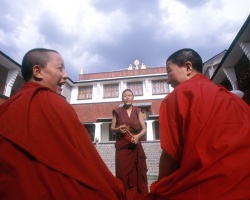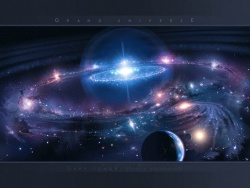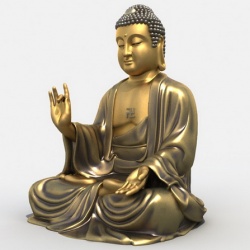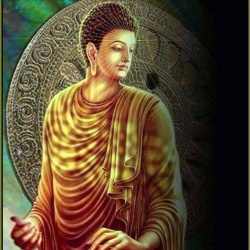Buddhism is Pagan
Buddhism is Pagan
By Indrajala (Jeffrey Kotyk)
Stepping into Tōdai-ji 東大寺 in Nara, Japan, founded by Ryōben in 741 under Emperor Shōmu (701-756), there are two guardian deities flanking the main image of Vairocana Buddha in the center. One is Virūpākṣa 廣目天王 in the northwest corner and the other is Vaiśravaṇa 多聞天王 in the northeast. These are two of the Four Mahārāja 四天王 (i.e., the Four Deva Kings), who are the four chief guardian deities of the four directions. These are ancient Buddhist deities that are said to protect the cosmos from evil forces.
Their details are as follows:
| Sanskrit | Chinese | Color | Direction | Jurisdiction (the four continents) | Retinue |
| Dhṛtarāṣṭra | 持國天 | Blue | East | Pūrvavideha | Gandharva, piśācī. |
| Virūḍhaka | 增長天 | Red | South | Jambudvīpa | Kumbhāṇḍa, preta. |
| Virūpākṣa | 廣目天 | White | West | Aparagodānīya | Nāga. |
| Vaiśravaṇa | 多聞天 | Black | North | Uttarakuru | Yakṣa, rākṣasa. |
We find them presented as images of art in some temples, particularly in East Asia, but there is a canonical basis for them in the earliest scriptures as well. In other words, these images were not produced just for the sake of decoration.
For example in the Dīgha Nikāya there is the Atanatiya Sutta which commences with the “four great kings having placed a guard over the four quarters, with a large army of Yakkhas, of Gandhabbas, of Kumbhandas, of Nagas; having placed troops; having placed a barricade of soldiers on four sides, came to the presence of the Blessed One, when the night was far advanced, illuminating the entire Vulture's Peak with their surpassing radiance, saluted the Blessed One and sat on one side.” They also make an appearance in the Mahasamaya Sutta.
The Four Mahārāja serve under Śakra Devānām Indra, otherwise just known as Indra, who resides in the realm of Trāyastriṃśa atop Mount Sumeru, the second celestial level of the desire realm (kāma-dhātu). Indra in the English speaking Buddhist world is often just regarded as a Hindu deity of no consequence to Buddhism, but this ignores his rather important role in ancient Buddhist cosmology and scripture. In the greater Indo-European perspective, Indra is equivalent to Thor.
The pan-Indo-European culture and language family extends from Ireland to Nepal. Languages like modern Nepali, English, Farsi and Icelandic all stem from a root going back thousands of years into prehistory. This is why Hellenic, Nordic and Vedic pantheons share similar characteristics. It is theorized that there was once a Proto-Indo-European religion.
Indra is regarded as the protector of humanity who fends off evil forces with his vajra (Zeus has a lightening bolt while Thor has a hammer). Historically in Indian Buddhism and elsewhere Indra, although being a worldly deity, has like the Four Mahārāja been regarded with the utmost esteem and respect. Indra is also on record as having received teachings personally from the Buddha in the Sakkapañha Sutta.
The presence of such deities who are presented as actual sentient gods, and clearly not metaphors or personified human qualities, challenges the assumption that Buddhism in general is atheist. As of late I have encountered discussions where people are quite keen on insisting Buddhism is atheist because the Buddha himself rejected the existence of creator deity, among other reasons. This blatantly ignores that the Buddha is also on record repeatedly acknowledging the existence of devas, spirits and other such beings, some of which are said to be quite powerful and important in maintaining the cosmic order. Other scriptures even have the Buddha having dialogues with gods. While such gods are said to be ultimately mortal, and are at times reminded of their less than supreme status, they are still existent within the classical cosmology.
It also popular to label Buddhism as “non-theistic”. Again, this is problematic. The word theist in English is derived from the Greek root theos (θεος), which does not strictly denote monotheism. While naturally in the English language context “non-theist” is likely to imply anti-monotheism (which applies to Buddhism), by definition it would also mean rejecting the existence of multiple gods, i.e., polytheism. Non-theism would entail rejecting polytheism. With so many different gods in the Buddhist pantheon can we really say Buddhism is non-theistic?
Some might argue that “non-theist” really just means that while gods may or may not exist, they are not important to the practice of Buddhadharma. Again, this is problematic simply because of the historical role worldly deities have played in Buddhist traditions across many cultures throughout the last twenty-five centuries, which I will demonstrate below. Contemporary Buddhist revisionists have a tendency to sanitize their Buddhism(s) of disagreeable religious elements while attempting to cater to the prevailing materialist ideology which is presently the orthodox belief system of our modern age. There is a popular urge among western Buddhists to gain the consent and approval of present day intellectuals instead of deferring to tradition and living masters. What is likely to meet with disapproval is either ignored or reformed into something more readily digestible. One recent example of this is Alan Pope who posits in his article that the six realms “represent different states of mind through which we cycle in the course of a human lifetime.”
Nevertheless, such ideas collapse when viewed from twenty-five centuries worth of tradition. This is why I believe suggesting Buddhism in general is “atheist” or “non-theist” is just a reflection of baseless popular revisionism by individuals who lack credentials and authority.
The idea that worldly gods, even if they do exist, are entirely irrelevant to Buddhist practice is also problematic in the face of ancient tradition. For instance, the Four Deva Kings Sūtra (Chn. Si Tianwang Jing 四天王經; Skt. *Catur Devarāja Sūtra), which is also quoted in Nāgārjuna's (c. 2nd-3rd cent.) Mahāprajñāpāramitā Upadeśa (Chn. Da Zhidu Lun 大智度論), details how the Four Mahārāja under Indra's direction descend with their entourage to inspect the world and its inhabitants. See the following:
- 《四天王經》:「諸天齋日,伺人善惡,須彌山上即第二忉利天,天帝名因,福德巍巍,典主四天,四天神王,即因四鎮王也,各理一方。常以月八日遣使者下,案行天下,伺察帝王臣民、龍、鬼、蜎蜚、蚑行、蠕動之類,心念、口言、身行善惡;十四日遣太子下;十五日四王自下;二十三日使者復下;二十九日太子復下;三十日四王復自下。」
- “The devas on the fasting days examine the good deeds and misdeeds of people. Atop Mount Sumeru there is the second (desire realm heaven) of Trāyastriṃśa where there is the celestial sovereign named Indra whose virtues are lofty. The chief four devas, the four deva kings, are Indra's four guardian kings, each managing one direction. On the eighth day envoys are always dispatched who descend on an inspection tour of the whole world. They investigate the sovereigns, kings, officials, citizens, nāgas, spirits, fliers, crawlers and wrigglers – the good deeds and misdeeds in the thoughts of their minds, the speech of their mouths and the actions of their bodies. On the fourteenth day he dispatches the princes who descend. On the fifteenth day the four kings themselves descend. On twenty-third day the envoys again descend. On the twenty-ninth the princes again descend. On the thirtieth day the four kings again personally descend.”
The cycle can be broken down like this:
- 8th, 23rd - Envoys
- 14th, 29th - Princes
- 15th, 30th - Four Kings
This occurs based on the waxing and waning lunar cycles. One half of the month is bright or śukla-pakṣa (the waxing) and the other half is the black or kṛṣṇa-pakṣa (the waning). Each period consists of fifteen days. These are also the designated days for fasting. Traditionally lay Buddhists take eight precepts, which are almost identical to those of a novice, on these days and abstain from eating past noon until dawn on the following day.
This might immediately sound like something rather Mahāyāna, though in reality it is also found in the Śrāvakayāna canon. See the Abhidharma Mahāvibhāṣā Śāstra (Chn. Da Piposha Lun 大毘婆沙論):
- 《大毘婆沙論》:「問何故唯說三十三天...答以彼諸天數數雲集、論善惡事、故偏說之。謂彼諸天於白黑月,每常八日、若十四日、若十五日,集善法堂,稱量世間善惡多少。復次三十三天常共伺察造善惡者。見造善者,便擁護之;見造惡者,即共嫌毀。」
- “Question – Why only speak of thirty-three devas? Answer – The devas frequently gather to discuss good deeds and misdeeds. Hence the partial discussion of them. The devas during the waxing and waning moons on every eighth, fourteenth and fifteenth always gather in the hall of saddharma to weigh the amount of good deeds and misdeeds in the world. Furthermore, the thirty-three devas always together inspect the creators of good deeds and misdeeds. Seeing one who has created good deeds, they then protect them. Seeing one who has created misdeeds, they then together resent and ruin them.”
The Abhidharma Mahāvibhāṣā Śāstra, attributed to Kātyāyanīputra, is generally held to have been composed sometime around the 2nd century CE in Northwest India. It is a key treatise of the Kashmir Sarvāstivāda school.
Another Sarvāstivāda text describes the significance of the aforementioned days. The significance of these specified days on the lunar calendar was probably shared with other native traditions at the time in Magadha. See the Sarvāstivādanikāya Vinaya Mātṛkā:
- 《薩婆多部毘尼摩得勒伽》:「王舍城諸外道,八日、十四日、十五日,集一處唄誦,多得利養,眷屬增長,爾時瓶沙王信佛法僧,往詣佛所……佛言聽諸比丘,八日、十四日、十五日,集一處唄誦說法。」
- “The heterodox of Rājagṛha on the eighth, fourteen and fifteenth would gather in one place to chant, gaining many offerings with their retinues growing. At that time King Bimbisāra had faith in the Buddha, Dharma and Sangha. He went to visit the Buddha. ... The Buddha said, 'I permit bhikṣus to gather in one place to chant and teach the Dharma on the eighth, fourteenth, and fifteenth.'”
...
Of course all this begs the question of whether or not we should uncritically accept all such scriptural descriptions as this as real or not. Do we unconditionally believe them just because they are in the canon? I think we can turn the question around and ask if there is any compelling reason to drop such ideas just because they are disagreeable with the contemporary prevailing cosmology and belief system?
There is no harm in trying to be mindful of one's behaviour on designated days according to the lunar cycle. Moreover, it is clear ancient Buddhist masters like Kātyāyanīputra and Nāgārjuna were supportive of such ideas and did not reject them. Obviously from a contemporary scientific perspective it is all superstition, but such judgement ignores the mental and spiritual spheres of human experience which I have discussed elsewhere.
In any case, as I have demonstrated already it is undeniable that Buddhism in ancient times, including during the Buddha's own teaching career, was concerned with gods. Their judgement and good favour was regarded as important. Furthermore, some deities were held as guardians and thus worthy of proper respect. This is still the case in much of the Buddhist world in Asia.
The other objection that might arise is all this was possibly added after the Buddha died and does not reflect his original ideas about liberation from saṃsāra; all such gods and so on being popular beliefs that infiltrated and settled into the ancient Buddhist pantheon.
Firstly, this ignores that even today many Buddhist yogis attest to the existence of such beings. Quite often it seems that they are encountered while one is in deep meditation, though not always. Moreover, the Buddha is on record in numerous scriptures as having dialogues with devas.
I myself once spoke to an eminent bhikkhu in Bodhgaya, India who spoke about encountering beautiful goddesses while meditating on some desolate mountain. In Asia where there is no secular Buddhism apart from in Japan, people readily accept mystical experiences as legitimate and not some kind psychotic episode. Plenty of sane and well-respected monks and nuns have such encounters and the scriptures regarding gods are not held in any contempt. You will probably never hear of anyone trying to paint the Buddha as a secular atheist humanist.
It begs the question what would the “Atheist Buddhists” say if the Buddha really did believe deities like Indra had a significant role to play in maintaining the cosmic order? I imagine they would write it off as mere cultural baggage, easily done away with in our modern age. However, to do so would be to imply oneself as superior to the Buddha and countless other later arhats and bodhisattvas. In which case, why call yourself a Buddhist? Refuge in the Triple Gem entails taking the Buddha as your supreme teacher and consequently accepting his teachings, i.e., the Dharma.
While the traditional cosmology might seem rather archaic and difficult to accept from a scientific perspective, this does not mean it must be abandoned. It does not reflect a materialist-scientific perspective at all, but rather includes other aspects of reality that are for our purposes immaterial and hence unavailable to materialist investigation. The whole Mount Sumeru model is not entirely a description of physical space, but something else.
The devas and other such beings that the Buddha is on record as having acknowledged and communicated with are a common feature in almost all human cultures throughout time. It is something of an aberration that in our modern industrial civilization they have been categorically dismissed as non-existent because they do not fit with the orthodox theories of the intelligentsia, despite the fact that sane people all around the world continue to have "paranormal encounters" with ghosts, spirits and the like.
I believe Buddhism in general with all its cultural developments throughout the last twenty-five centuries is best described as polytheist and I hope I have demonstrated this. In that light, one could actually call it pagan, though this might unsettle some people for fear of being associated with the Neo-Pagan movement in the west.
Is it not interesting, though, that one of the prime protectors of Buddhadharma from the early sangha onward was Indra, who is basically Thor in Indian garb? The myriad deities in the greater cosmology might be ultimately mortal and subject to the pains of saṃsāra like us, though that does not negate the role they have to play in the cosmic order.




